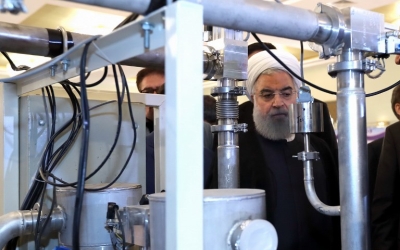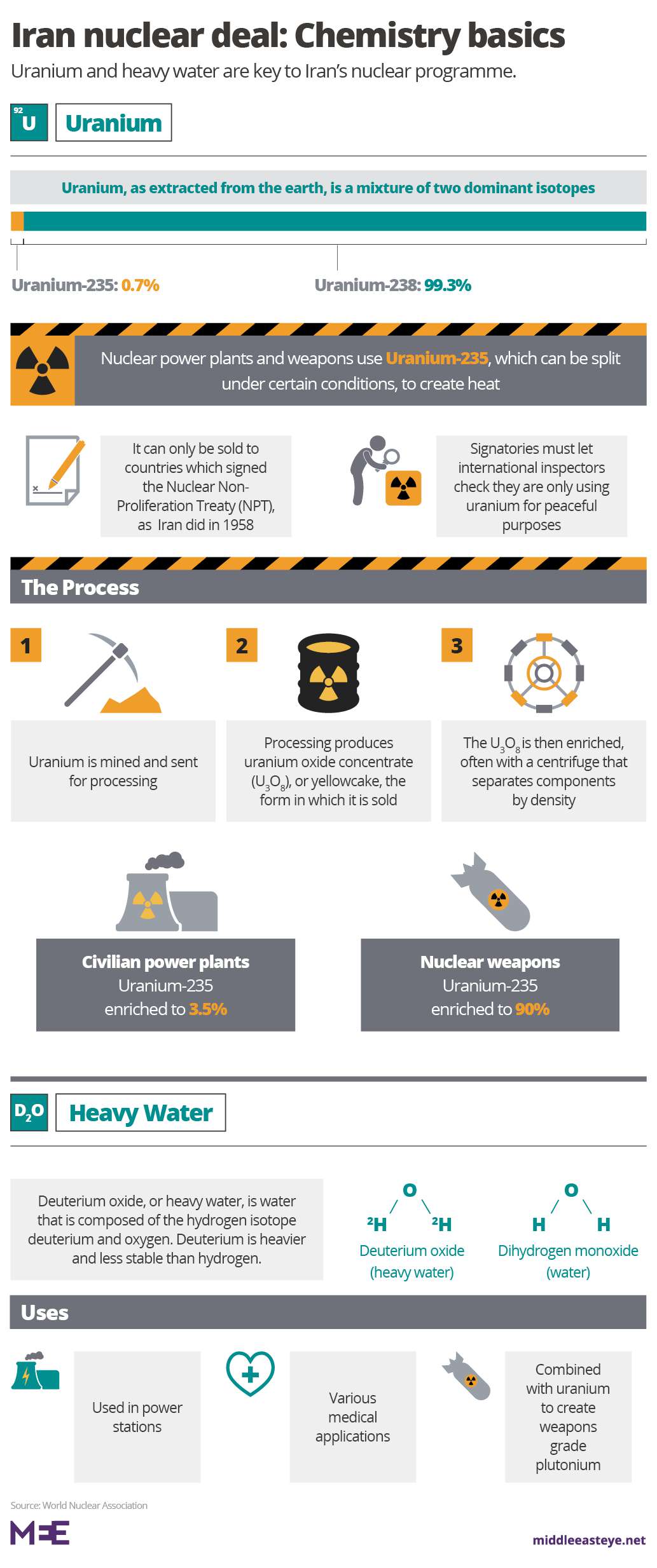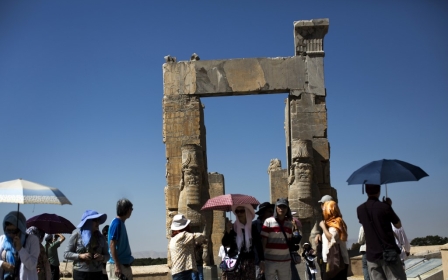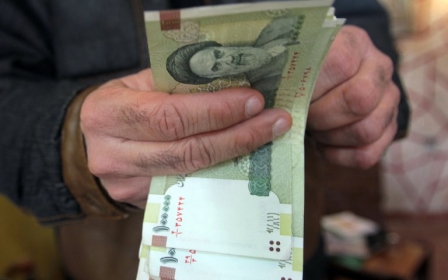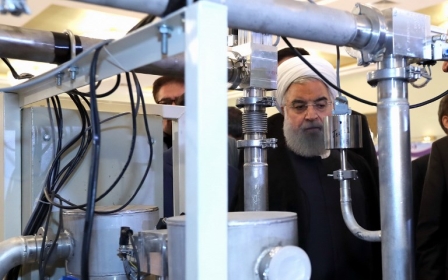Iran breaks enriched uranium limit, endangering nuclear pact
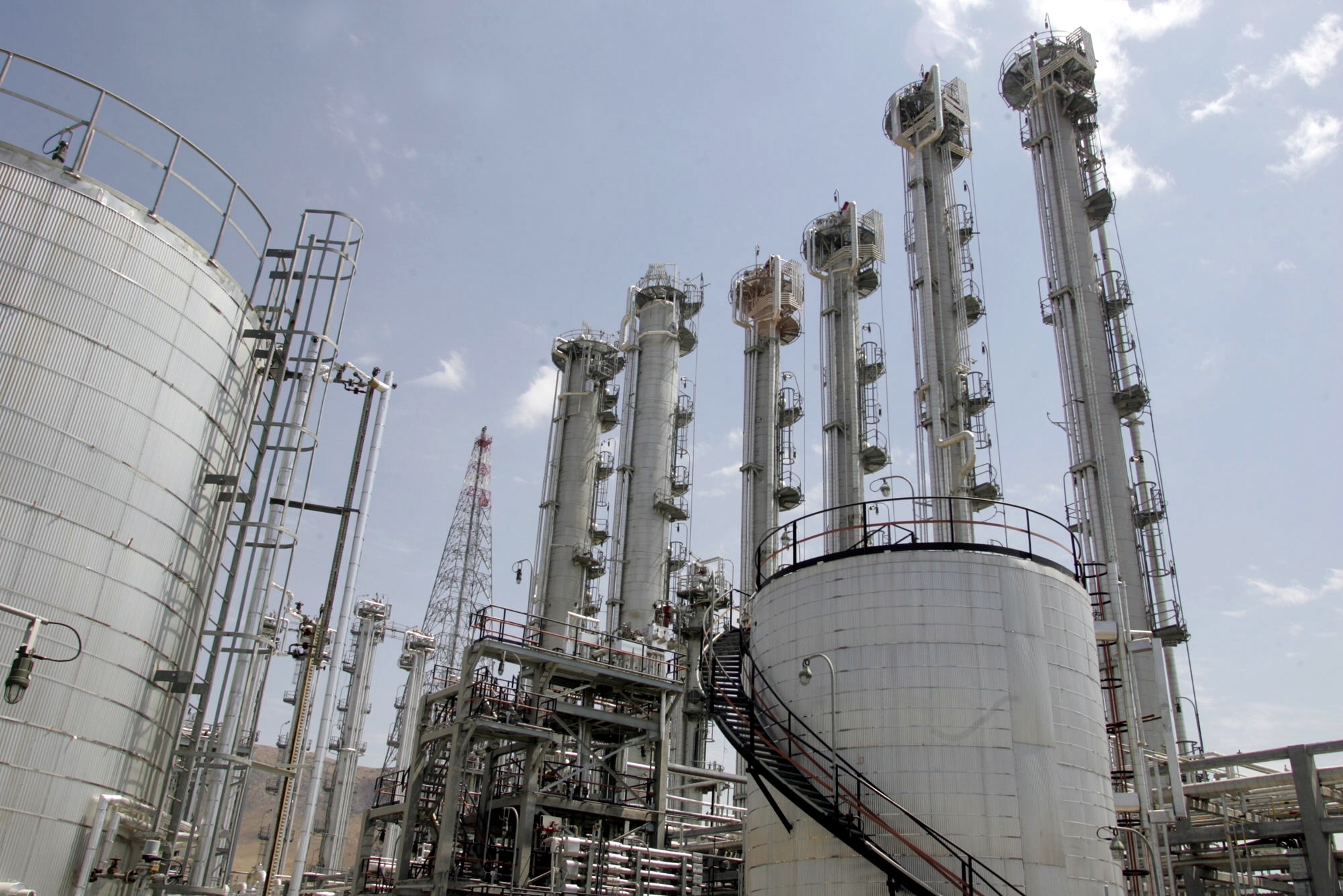
Iran has exceeded its threshold for stockpiles of low-enriched uranium, breaking a key limit outlined in the troubled 2015 nuclear deal, the International Atomic Energy Agency (IAEA) confirmed on Monday.
"We can confirm that IAEA Director General Yukiya Amano has informed the Board of Governors that the Agency verified on 1 July that Iran's total enriched uranium stockpile exceeded [the deal's limit]," an IAEA spokesman said in a statement.
'The Europeans have failed to fulfil their promises of protecting Iran's interests under the deal'
- Mohammad Javad Zarif, Iranian foreign minister
Tehran had warned on 17 June that it would exceed the 300kg cap stipulated by the nuclear deal in ten days, which fell last Thursday.
The warning had followed harsh sanctions that the United States placed on Iran following Washington’s pull-out last year from the landmark nuclear pact.
Iranian foreign ministry spokesman Abbas Mousavi said that the actions taken were "reversible".
New MEE newsletter: Jerusalem Dispatch
Sign up to get the latest insights and analysis on Israel-Palestine, alongside Turkey Unpacked and other MEE newsletters
However, Iranian Foreign Minister Mohammad Javad Zarif warned that his country's next step would be to enrich uranium above 3.67 percent fissile purity unless European countries save the deal.
"The Europeans have failed to fulfil their promises of protecting Iran's interests under the deal," he said, according to the state-run Iranian broadcaster IRIB.
Later on Monday, Zarif said on Twitter that Iran had not violated the international agreement. He reiterated that the decision is reversible.
Iran's Atomic Energy Organisation said it will soon issue a report about exceeding the stockpile limit, the semi-official Fars news agency reported.
Fars did not provide any additional information on what the report may contain or when it might be issued.
'Playing with fire'
US President Donald Trump warned Iran of "playing with fire" after hearing the news.
"They know what they’re doing. They know what they’re playing with, and they’re playing with fire," he said during a bill signing at the White House.
Similarly, Secretary of State Mike denounced the 2015 nuclear deal in a statement, calling Iran's "nuclear program" as a threat to "regional security".
"No nuclear deal should ever allow the Iranian regime to enrich uranium at any level," he said.
"As long as Iran continues to reject diplomacy and expand its nuclear program, the economic pressure and diplomatic isolation will intensify," he added.
In May 2018, Trump pulled the US from the Joint Comprehensive Plan of Action, the deal between Tehran and world powers that saw Iran drastically scale back its nuclear programme in exchange for the easing of sanctions against its economy.
Sky high tensions
A separate 60-day warning over the nuclear deal issued by Iran in May is set to fall on Monday, 8 July, with Tehran threatening it will act unless world powers moved to protect its interests against the Trump administration’s “maximum pressure” campaign.
Analysts say Tehran may decide to breach the more serious percentage level of uranium enrichment next week if its demands are not met.
Enriching uranium to a low level of 3.6 percent fissile material is the first step in a process that could eventually allow Iran to amass enough highly enriched uranium to build a nuclear warhead.
The deal’s remaining signatories - the United Kingdom, France, Germany, Russia and China - have sought to salvage the agreement, which is designed to provide Iran sanctions relief in return for Tehran curbing its nuclear weapons development programme.
On Friday, the European Union launched a trade mechanism called Instex, which is designed to help navigate US sanctions by conducting small-scale trade using a bartering system.
Iran has complained that the system is inadequate to deal with the barriers to international trade transactions needed to circumvent US sanctions.
On Monday, UN Secretary-General Antonio Guterres also urged Iran to stick to its commitments under the nuclear deal, a spokesperson for the office said, as quoted by AFP news agency.
Guterres called on parties involved in the nuclear deal to adress their differences through a dispute mechanism built into the framework of the agreement.
Meanwhile, tensions between Iran and the US are sky high. Over the past year, Iran's economy has suffered considerably as Washington has slapped several new sanctions on the country, targeting everything from oil sales to the Islamic Republic's supreme leader.
In recent weeks attacks have been staged on ships around the strategic Straight of Hormuz waterway, a conduit for much of the world's oil supplies. The US has blamed Tehran for the attacks, which it denies.
A senior Iranian parliamentarian said on Monday that US-ally Israel would be destroyed in half an hour if Washington attacks Iran, according to the the semi-official Mehr news agency
"If the US attacks us, only half an hour will remain of Israel's lifespan," Mojtaba Zolnour, the chairman of the Iranian parliament's National Security and Foreign Policy commission said, according to Mehr.
On 20 June, Iran shot down an unmanned US drone, which Tehran said was over Iranian territory but Washington maintained was above international waters.
US President Donald Trump later said that he had cancelled a series of air strikes on Iran as his war planes were mid air, saying he changed his mind after being told how many lives were at risk.
Despite the Trump administration's hostility to the Iranian deal and its pull-out, earlier this month, the State Department warned Iran to abide by the pact the US sought to tear up.
“We continue to call on the Iranian regime not to obtain a nuclear weapon, to abide by their commitments to the international community,” State Department spokeswoman Morgan Ortagus said at the time.
Mossad chief's warning
In a rare public appearance on Monday, Joseph (Yossi) Cohen, the chief of Israel's Mossad spy service, said: "The Mossad or the State of Israel did not sign the nuclear deal [and] will do everything to ensure that Iran will never have nuclear weaponry," he said.
"Currently, it's about uranium enrichment at a relatively low percentage, and in amounts that are not large. The threat is to step up enrichment and increase the amounts.
"Just imagine what will happen if the material stockpiled by the Iranians becomes fissionable, at military-enrichment grade, and then an actual bomb.
"The Middle East, and then the entire world, will be a different place. Therefore, the world must not allow this to happen."
Iran denies ever seeking to acquire a nuclear bomb.
Middle East Eye delivers independent and unrivalled coverage and analysis of the Middle East, North Africa and beyond. To learn more about republishing this content and the associated fees, please fill out this form. More about MEE can be found here.


